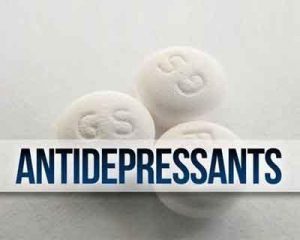- Home
- Editorial
- News
- Practice Guidelines
- Anesthesiology Guidelines
- Cancer Guidelines
- Cardiac Sciences Guidelines
- Critical Care Guidelines
- Dentistry Guidelines
- Dermatology Guidelines
- Diabetes and Endo Guidelines
- Diagnostics Guidelines
- ENT Guidelines
- Featured Practice Guidelines
- Gastroenterology Guidelines
- Geriatrics Guidelines
- Medicine Guidelines
- Nephrology Guidelines
- Neurosciences Guidelines
- Obs and Gynae Guidelines
- Ophthalmology Guidelines
- Orthopaedics Guidelines
- Paediatrics Guidelines
- Psychiatry Guidelines
- Pulmonology Guidelines
- Radiology Guidelines
- Surgery Guidelines
- Urology Guidelines
MI patients on antidepressants have lower one-year survival

Ms. Nadia Fehr and associates conducted an observational study to assess the association of antidepressant prescription at hospital discharge with the one-year outcomes of patients with acute myocardial infarction.The researchers found that Heart attack patients prescribed antidepressants have lower one-year survival rates.The research has been presented at Acute Cardiovascular Care 2018, a European Society of Cardiology Congress.
Lead author Ms Nadia Fehr, a medical student at the University of Zurich, Switzerland, said: "Previous studies have suggested that cardiovascular disease may increase the likelihood of being depressed. On the other hand, depression appears to increase the probability of developing cardiovascular risk factors. However, little is known about the impact of depression on outcome after a heart attack."
The observational study of nearly 9,000 patients found that those prescribed antidepressants at discharge from hospital after a heart attack had a 66% greater risk of mortality one year later than patients not prescribed the drugs, although they noted the cause is not necessarily related associates directly to the antidepressants.
Data from AMIS Plus, the Swiss nationwide registry for acute myocardial infarction, were used to analyse 8,911 heart attack patients admitted to hospitals in Switzerland between March 2005 and August 2016. Patients were followed up by telephone 12 months after discharge.
The researchers compared patients who received antidepressant medication at discharge with those who did not with regard to baseline characteristics and one-year outcomes including mortality, a subsequent heart attack, and stroke.
A total of 565 (6.3%) patients received antidepressants at discharge from the hospital. Compared to those who did not receive the drugs, patients prescribed antidepressants were predominantly female, older, and more likely to have hypertension, diabetes, dyslipidemia, obesity, and comorbidities. They were less likely to undergo percutaneous coronary intervention or receive P2Y12 blockers or statins and stayed in the hospital longer.
After adjusting for baseline characteristics the researchers found that the rates of stroke and subsequent heart attacks were similar between the two groups, but patients prescribed antidepressants had significantly worse survival. The rate of all-cause mortality at one-year after discharge was 7.4% in patients prescribed antidepressants compared to 3.4% for those not prescribed antidepressants (p<0.001).
The antidepressant prescription was an independent predictor for mortality and increased the odds by 66% (odds ratio: 1.66; 95% confidence interval: 1.16 to 2.39).
"This was an observational study so we cannot conclude that antidepressants caused the higher death rate," noted Ms Fehr.
She concluded: "Our study showed that many patients are treated with antidepressants after a heart attack. More research is needed to pinpoint the causes and underlying pathological mechanisms for the higher mortality we observed in this patient group."

Disclaimer: This site is primarily intended for healthcare professionals. Any content/information on this website does not replace the advice of medical and/or health professionals and should not be construed as medical/diagnostic advice/endorsement or prescription. Use of this site is subject to our terms of use, privacy policy, advertisement policy. © 2020 Minerva Medical Treatment Pvt Ltd